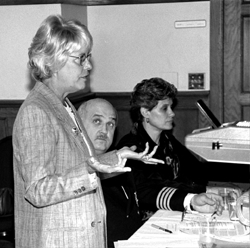The University Record, December 6, 1999 By Jane R. Elgass

Robert Lechtanski is confident that the City of Ann Arbor will make the move to 2000 with no major problems. Assistant fire chief and director of the city’s Emergency Management Division, Lechtanski told a brown-bag audience last week that the city has been preparing for the rollover for several years and that the systems under its control are Y2K-ready. Everything was tested, in fact, on Sept. 9 (of the famed 9-9-99 predictions), with two “glitches” uncovered that since have been remedied.
The unknown in the mix, he said, is the human factor.
Manmade problems—not Y2K-related computer snafus—would result, for instance, if everyone decides at 12:01 a.m. Jan. 1 “to see if they really have water by turning on faucets, by picking up the phone to see if they have a dial tone, by turning on all their lights to assure themselves that they really do have electricity.”
Actions such as these would stress those service systems at any time, not just shortly after midnight Jan. 1, he explained.
Lechtanski told those attending the program on “Y2K & You,” sponsored by the Faculty and Staff Assistance Program (FASAP), to plan for the rollover “just as you would for an advancing winter storm or blizzard or the threat of severe weather or an ice storm that might bring down power lines.”
“You need to be prepared, but don’t just do it for Y2K,” he stressed. “We had 30 inches of snow in 14 days last year. And remember the ice storm of 1997?”
Lechtanski advised “putting together a ‘care package’ for yourself and family that includes enough non-perishable canned or dried food for three to five days, flashlights and a battery-operated radio, as well as extra batteries—and a manual can opener. What good would an electric opener be,” Lechtanski asked, “with no power?” He also suggested putting new batteries in flashlights and radios and turning them on to see how long the batteries last. That will give you an idea of how many extra batteries you might need to have on hand to make it through the emergency situation.
And don’t forget “calming foods”—maybe a chocolate bar or special herbal tea—and toys and games for the kids that aren’t dependent on power from that socket in the wall.
Other things to consider in preparing for the rollover include making sure you have on hand checking account and credit card records for the past two months and the amount of cash you’d normally have on hand prior to a long weekend. Individuals with special medication needs might consider filling prescriptions a week or so ahead of time if they expire near the start of the new year. And top off the gas tank after that final errand.
Lechtanski also suggested using Y2K preparations as a chance to get to “re-know your neighbors. Take a walk around the neighborhood. Check on those, such as the elderly, who may have special needs or concerns. You’ll find people who are willing to help you out, and maybe someone who could use a bit of help or assurance from you.”
The key in all this, Lechtanski stressed, is “to not wait until the last minute, and to simply approach your advance preparation as you would for similar situations that might cause a brief interruption to your everyday life.”
Also speaking at the program in the Pond Room at the Michigan Union were Karen Semenuk, a FASAP counselor, and Gloria Thiele, the University’s Y2K coordinator.
Thiele assured the audience that the University is prepared for the rollover and announced a hotline that will be activated this week that members of the University community can call for updates during the rollover weekend—1-877-UM-Y2K-OK.
Confident of a glitch-free rollover period (Dec. 31–Jan. 3), Thiele cited the information on the back page of the Nov. 22 Record and encouraged audience members to shut down computers and disconnect other electrical appliances before leaving campus for the holiday break. “Reduced electrical use will ensure that the University can support a temporary failure if that becomes necessary,” she explained.
Thiele also called attention to the ad that appears on page 20 of this issue of the Record (www.year2000.umich.edu), which includes a checklist of things to do before heading home for the winter holiday season, as well as the hotline number and information about radio stations that will broadcast special announcements should any problems be encountered at the University.
Semenuk addressed the human side of the move to the next century, noting that individual and collective overreaction may likely be more of a problem than any physical problem as people deal with the extra stresses that the move to the new millennium seems to have engendered.
Individuals should address their anxieties and determine their “comfort zone”—what it will take for them to approach Jan. 1 in a relaxed mode. Information is the best solution to most of the anxiety, Semenuk said, with the worst-case scenario being someone who normally suffers from high anxiety who at the same time possesses little credible information. “Individuals need to act and prepare according to what will make them most comfortable,” she said.
She also noted that a bit of anxiety is to be expected. “We’ve come to trust technology,” she explained, “plus we generally have a sense of being in control of our lives. We just don’t have all the answers to the five Ws—who, what, where, when and why. The only one defined is when.
“We like a sense of certainty,” Semenuk explained, adding that she has seen Y2K described as “trying to nail a cream pie to the wall.”
“Reaction and over-reaction are the greater issues,” she added. “We need to be prepared in a reasonable way. We need to be prepared, not surprised.”
The FASAP program will be repeated 3–4:15 p.m. Dec. 13 in the Henderson Room, Michigan League. For information, call 936-8660.

